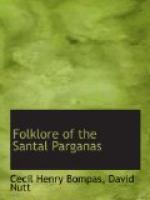“Be witness be witness
for me ‘Turu tree’
When the Raja’s daughter
comes.”
and so singing he tied his horse to the roots of the tree and himself climbed up into the branches, and sitting in the tree he pulled off and threw down a number of twigs. Late at night the Raja’s daughter came; she saw the horse tied and the twigs scattered on the ground, but no other sign of her lover. And at last she got tired of waiting and called the Turu tree to witness, singing:—
“Be witness be witness
for me ‘Turu tree’
When the merchant’s
son comes.”
As she finished her song the merchant’s son threw down a large branch to her, so she looked up and saw him sitting in the tree. Then she climbed up to him and began to scold him for putting her to the pain of waiting so long. He retorted “It was you who made me anxious by keeping me waiting.” “That was not my fault: you know how much work a woman has to do. I had to cook the supper and put my parents to bed and rub them to sleep. Climb down and let us be off.” So they climbed down from the tree and mounted the horse and rode off to a far country. On the road the girl became very thirsty but in the dense jungle they could find no water, at last the merchant’s son threw a stone at hazard and they heard it splash in a pool; so they went in the direction of the sound and there they found water but it was foul and full of worms and the girl refused to drink it. She said that she would only drink water “which had a father and mother.”
So they went on their way, and after a time they came to a number of crows holding a meeting and in the midst was an owl with its head nodding drowsily; it was seeing dreams for them; every now and then a crow would give it a shove and ask what it had dreamt, but the owl only murmured that it had not finished and went off to sleep again. At last it said “I have seen a gander and a goose go down into a river and swim about in it.”
The merchant’s son and his companion went on and presently came to a river in full flood, which was quite uncrossable; on the far bank was a cow lowing to a calf which had been left on the bank where they were. When she saw them the girl began to sing:—
“The cow lows for its
calf
The calf bleats for its mother:
My father and mother
Are weeping for me at home.”
When he heard her lament like this the merchant’s son exclaimed
“You women are all alike, come let us go back.”
“How can we go back now?” answered the girl “You of course can pretend that you have been hunting; but we women lose our character if we are hidden by a bush for a minute.”
So as they could not cross the river by themselves, a goose and gander carried them across on their backs. As they went on the merchant’s son asked the girl how far she would like to go, a six days’ journey or a six months’ journey. He told her that in the six months’ journey they would only have fruits and roots and such like to eat and water to drink, but the six days’ journey was easy and free from hardship.




